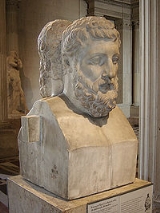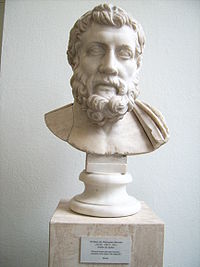
Metrodorus
Encyclopedia
Metrodorus of Lampsacus was a Greek
philosopher of the Epicurean school. Although one of the four major proponents of Epicureanism
, only fragments of his works remain.
on the Hellespont. His father's name was Athenaeus or Timocrates, his mother's Sande. Together with his brother Timocrates of Lampsacus
he joined the school Epicurus
had set up in their home town. Timocrates, however, soon fell out with both his brother and Epicurus and devoted the rest of his life to spreading malicious slander about them. Metrodorus on the other hand soon became the most distinguished of the disciples of Epicurus
, with whom he lived on terms of the closest friendship, and whom he later followed to Athens, never having left him since he became acquainted with him, except for six months on one occasion, when he paid a visit to his home. He died in 278/7 BC, in the 53rd year of his age, seven years before Epicurus, who would have appointed him his successor had he survived him. He left behind him a son named Epicurus, and a daughter, whom Epicurus, in his will, entrusted to the guardianship of Amynomachus
and Timocrates of Potamus, to be brought up under the joint care of themselves and Hermarchus
, and provided for out of the property which he left behind him. In a letter also which he wrote upon his death-bed, Epicurus commended the children to the care of Idomeneus
, who had married Batis
, the sister of Metrodorus. The 20th of each month was kept by the disciples of Epicurus as a festive day in honour of their master and Metrodorus. Leontion
is spoken of as the wife or mistress of Metrodorus.
 The philosophy of Metrodorus appears to have been of a more sensual kind than that of Epicurus. Perfect happiness, according to Cicero
The philosophy of Metrodorus appears to have been of a more sensual kind than that of Epicurus. Perfect happiness, according to Cicero
's account, he made to consist in having a well-constituted body, and knowing that it would always remain so. He found fault with his brother for not admitting that the belly was the test and measure of every thing that pertained to a happy life. According to Seneca
, Epicurus placed Metrodorus among those who acquire assistance in working their way towards truth.
Diogenes Laërtius lists the following works by Metrodorus:
Metrodorus also wrote Against the Euthyphro
, and Against the Gorgias
of Plato
. Small fragments of his work On Wealth, were found among the charred remains at the Villa of the Papyri
at Herculaneum
. Philodemus
made use of this work in his own works On Wealth, and On Household Economics. Philodemus cites Metrodorus as the author of the view that Cynic poverty was to be rejected in favour of a more affluent way of life, although wealth
in no way contributes to happiness
.
Hellenistic Greece
In the context of Ancient Greek art, architecture, and culture, Hellenistic Greece corresponds to the period between the death of Alexander the Great in 323 BC and the annexation of the classical Greek heartlands by Rome in 146 BC...
philosopher of the Epicurean school. Although one of the four major proponents of Epicureanism
Epicureanism
Epicureanism is a system of philosophy based upon the teachings of Epicurus, founded around 307 BC. Epicurus was an atomic materialist, following in the steps of Democritus. His materialism led him to a general attack on superstition and divine intervention. Following Aristippus—about whom...
, only fragments of his works remain.
Life
Metrodorus was a native of LampsacusLampsacus
Lampsacus was an ancient Greek city strategically located on the eastern side of the Hellespont in the northern Troad. An inhabitant of Lampsacus was called a Lampsacene. The name has been transmitted in the nearby modern town of Lapseki.-Ancient history:...
on the Hellespont. His father's name was Athenaeus or Timocrates, his mother's Sande. Together with his brother Timocrates of Lampsacus
Timocrates of Lampsacus
Timocrates of Lampsacus was a renegade Epicurean who made it his life's mission to spread slander about Epicurus' philosophy and way of life. He was the elder brother of Metrodorus, Epicurus' best friend and most loyal follower, who was born in Lampsacus in the late 4th century BC. He studied with...
he joined the school Epicurus
Epicurus
Epicurus was an ancient Greek philosopher and the founder of the school of philosophy called Epicureanism.Only a few fragments and letters remain of Epicurus's 300 written works...
had set up in their home town. Timocrates, however, soon fell out with both his brother and Epicurus and devoted the rest of his life to spreading malicious slander about them. Metrodorus on the other hand soon became the most distinguished of the disciples of Epicurus
Epicurus
Epicurus was an ancient Greek philosopher and the founder of the school of philosophy called Epicureanism.Only a few fragments and letters remain of Epicurus's 300 written works...
, with whom he lived on terms of the closest friendship, and whom he later followed to Athens, never having left him since he became acquainted with him, except for six months on one occasion, when he paid a visit to his home. He died in 278/7 BC, in the 53rd year of his age, seven years before Epicurus, who would have appointed him his successor had he survived him. He left behind him a son named Epicurus, and a daughter, whom Epicurus, in his will, entrusted to the guardianship of Amynomachus
Amynomachus
Amynomachus ,son of Philocrates, from the Attic deme of Bate was, together with Timocrates son of Demetrius from Potamos, the heir of Epicurus . Whether they were Epicurean philosophers themselves is uncertain. Epicurus' property was given to them on condition that they give the Garden to...
and Timocrates of Potamus, to be brought up under the joint care of themselves and Hermarchus
Hermarchus
Hermarchus or Hermarch , sometimes incorrectly written Hermachus , was an Epicurean philosopher. He was the disciple and successor of Epicurus as head of the school. None of his writings survive. He wrote works directed against Plato, Aristotle, and Empedocles. A fragment from his Against...
, and provided for out of the property which he left behind him. In a letter also which he wrote upon his death-bed, Epicurus commended the children to the care of Idomeneus
Idomeneus of Lampsacus
Idomeneus of Lampsacus was a friend and disciple of Epicurus. We have no details of his life, except that he married Batis of Lampsacus, the sister of Metrodorus, and he was a court dignitary at Lampsacus around 306-301 BC...
, who had married Batis
Batis of Lampsacus
Batis of Lampsacus, was a student of Epicurus at Lampsacus in the early 3rd century BC. She was the sister of Metrodorus and wife of Idomeneus...
, the sister of Metrodorus. The 20th of each month was kept by the disciples of Epicurus as a festive day in honour of their master and Metrodorus. Leontion
Leontion
Leontion was a Greek Epicurean philosopher.She was a pupil of Epicurus and his philosophy. She was the companion of Metrodorus of Lampsacus. The information we have about her is scant. She was said to have been a hetaera - a courtesan or prostitute. This might be misogynistic or anti-Epicurean...
is spoken of as the wife or mistress of Metrodorus.
Philosophy

Cicero
Marcus Tullius Cicero , was a Roman philosopher, statesman, lawyer, political theorist, and Roman constitutionalist. He came from a wealthy municipal family of the equestrian order, and is widely considered one of Rome's greatest orators and prose stylists.He introduced the Romans to the chief...
's account, he made to consist in having a well-constituted body, and knowing that it would always remain so. He found fault with his brother for not admitting that the belly was the test and measure of every thing that pertained to a happy life. According to Seneca
Seneca the Younger
Lucius Annaeus Seneca was a Roman Stoic philosopher, statesman, dramatist, and in one work humorist, of the Silver Age of Latin literature. He was tutor and later advisor to emperor Nero...
, Epicurus placed Metrodorus among those who acquire assistance in working their way towards truth.
Diogenes Laërtius lists the following works by Metrodorus:
- Πρὸς τοὺς ἰατρούς, τρία - Against the Physicians (3 volumes)
- Περὶ αἰσθήσεων - On Sensations
- Πρὸς Τιμοκράτην - Against Timocrates
- Περὶ μεγαλοψυχίας - On Magnanimity
- Περὶ τῆς Ἐπικούρου ἀρρωστίας - On Epicurus's Weak Health
- Πρὸς τοὺς διαλεκτικούς - Against the Dialecticians
- Πρὸς τοὺς σοφιστάς, ἐννέα - Against the Sophists (9 volumes)
- Περὶ τῆς ἐπὶ σοφίαν πορείας - On the Way to Wisdom
- Περὶ τῆς μεταβολῆς - On Change
- Περὶ πλούτου - On Wealth
- Πρὸς Δημόκριτον - Against Democritus
- Περὶ εὐγενείας - On Noble Birth
Metrodorus also wrote Against the Euthyphro
Euthyphro
Euthyphro is one of Plato's early dialogues, dated to after 399 BC. Taking place during the weeks leading up to Socrates' trial, the dialogue features Socrates and Euthyphro, a man known for claiming to be a religious expert. They attempt to pinpoint a definition for piety.-Background:The dialogue...
, and Against the Gorgias
Gorgias (dialogue)
Gorgias is a Socratic dialogue written by Plato around 380 BC. In this dialogue, Socrates seeks the true definition of rhetoric, attempting to pinpoint the essence of rhetoric and unveil the flaws of the sophistic oratory popular in Athens at this time...
of Plato
Plato
Plato , was a Classical Greek philosopher, mathematician, student of Socrates, writer of philosophical dialogues, and founder of the Academy in Athens, the first institution of higher learning in the Western world. Along with his mentor, Socrates, and his student, Aristotle, Plato helped to lay the...
. Small fragments of his work On Wealth, were found among the charred remains at the Villa of the Papyri
Villa of the Papyri
The Villa of the Papyri is a private house in the ancient Roman city of Herculaneum . Situated north-west of the township, the residence sits halfway up the slope of the volcano Vesuvius without other buildings to obstruct the view. The villa suburbana was owned by Julius Caesar's father-in-law,...
at Herculaneum
Herculaneum
Herculaneum was an ancient Roman town destroyed by volcanic pyroclastic flows in AD 79, located in the territory of the current commune of Ercolano, in the Italian region of Campania in the shadow of Mt...
. Philodemus
Philodemus
Philodemus of Gadara was an Epicurean philosopher and poet. He studied under Zeno of Sidon in Athens, before moving to Rome, and then to Herculaneum. He was once known chiefly for his poetry preserved in the Greek anthology, but since the 18th century, many writings of his have been discovered...
made use of this work in his own works On Wealth, and On Household Economics. Philodemus cites Metrodorus as the author of the view that Cynic poverty was to be rejected in favour of a more affluent way of life, although wealth
Wealth
Wealth is the abundance of valuable resources or material possessions. The word wealth is derived from the old English wela, which is from an Indo-European word stem...
in no way contributes to happiness
Happiness
Happiness is a mental state of well-being characterized by positive emotions ranging from contentment to intense joy. A variety of biological, psychological, religious, and philosophical approaches have striven to define happiness and identify its sources....
.

